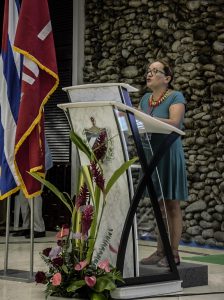In early November, Elsa Nury Martínez, Chair of the National Agricultural Union Federation in Colombia (FENSUAGRO) and member of the Latin American Coordination of Rural Organisations (CLOC-Via Campesina), received death threats against her and her family.
These threats came from the ‘Black Eagles’ narco-paramilitary group (Águilas Negras – Bloque Capital), who singled out the peasant leader as a military target in a printed leaflet. The paramilitary organisation is demanding her and other Colombian social leaders and politicians to abandon the territories where they carry out their activism and social/political work.
Since the signing of the Peace Accords in 2016, 38 members of FENSUAGRO [1] have been murdered by paramilitary groups “with the complicit inaction of the Colombian administration,” stressed the National Rural and Indigenous Women’s Association of Chile (ANAMURI), in solidarity with Martínez.
This year alone, there have been over 300 murders in Colombia, added to 73 massacres, many of which included children and teenagers [2]. According to the Institute for Development and Peace Studies (Indepaz [3]) at least 251 social leaders and human rights defenders [4] have been murdered in 2020, as well as 52 of the people who signed the Peace Accords and 10 of their relatives.
“The situation of human rights violations in Colombia is extremely concerning,” said Nury Martínez in interview with Real World Radio. “Which is why we believe there needs to be strong commitment of internationalist solidarity, to hold the government to account for the massacres that have been taking place.”
The role of the international community is key: “Although the European Union is providing a lot of resources for implementation of the Peace Accords, these resources are not being used for that purpose. On the contrary, they are being used to attack peasant, indigenous and black communities and the social leaders of the country,” she added.
The systematic attacks suffered by rights defenders [5] is just one of the fallouts of the failure to comply with the Peace Accords [6], signed in Havana, Cuba in 2016, by the Revolutionary Armed Forces of Colombia (FARC) and the Colombian State.
“The threats I experienced are part of the daily lives of the leaders of FENSUAGRO and defenders around the country. This is related to the fact that the issue that has been most disregarded in implementation of the Peace Accords is the issue at the origin of the social and armed conflict in Colombia: the inadequate distribution of land.”
Martínez explained that Iván Duque’s administration prefers to focus on “the implementation of Free Trade Agreements and trade treaties with transnational corporations, for the exploitation of natural resources in our territories, instead of complying with the Peace Accords. This is a sign that people and defenders of territories are a nuisance for the government.”
The Peace Accords also include providing guarantees for defenders to be “able to exist”, reminded Martínez. “It should not be a crime to be a social leader in Colombia.”
“So far there hasn’t been any answer from the government, they really don’t care. The government is saying that there are several organised armed groups and the murders and massacres are just conflicts in the territories. And they don’t even follow up on the commitments that were previously signed regarding the protection of leaders.”
As a response to state negligence, social movements have launched a Social and Community Minga [7] for the right to life, peace and democracy. They have taken their call to the capital city, Bogota: “We want our structural problems to be solved. This implies a revision of Free Trade Agreements, which currently damage local food production in particular, as 15 million tons of food are imported at the expense of the peasant economy of the country.” Free Trade Agreements also imply the exploitation of gold, minerals, oil, water looting and the rise of extractivist projects by the US and European Union countries.
